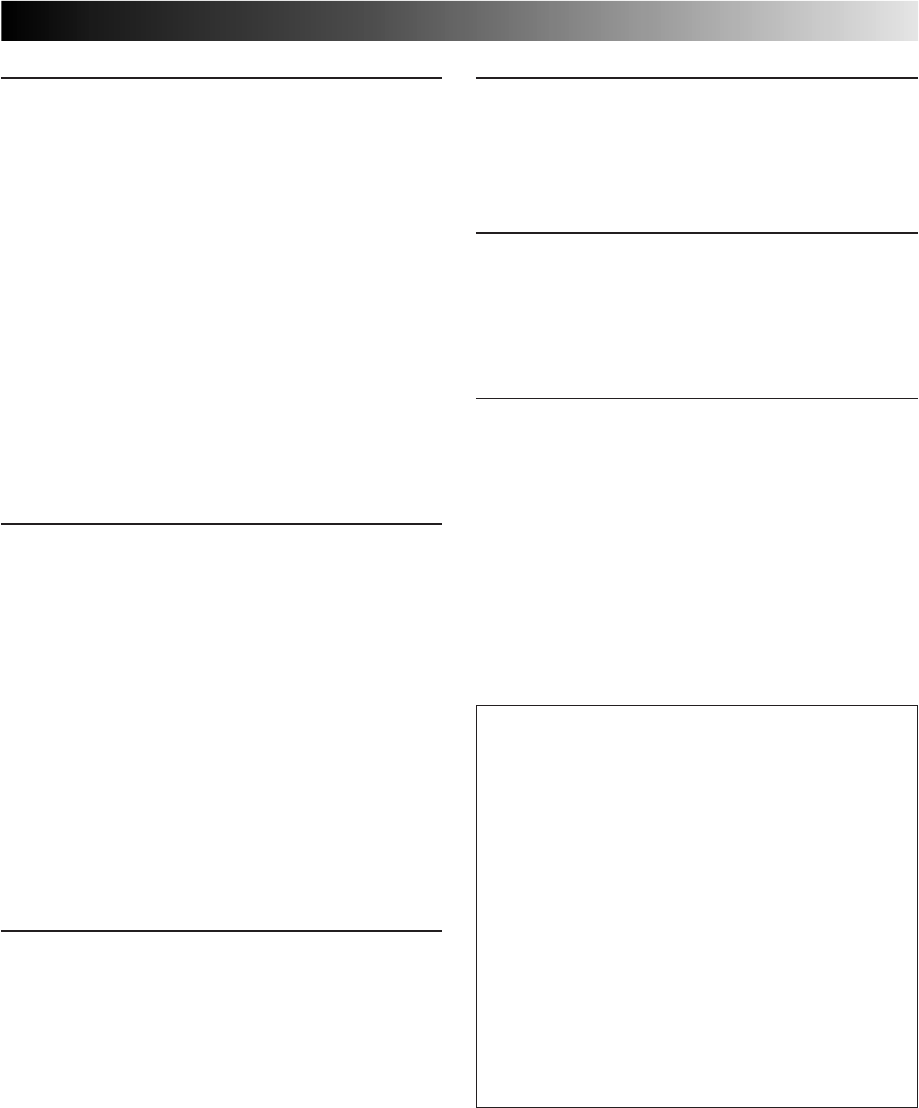
EN 79
GENERAL
Power requirement : AC 120 V`, 60 Hz
Power consumption
Power on : 42 W
Power off : 5.5 W
Temperature
Operating : 5°C to 40°C (41°F to 104°F)
Storage : –20°C to 60°C (–4°F to 140°F)
Operating position : Horizontal only
Dimensions (WxHxD) : 437 mm x 127 mm x 390 mm
(17-1/4" x 5" x 15-3/8")
Weight : 7.5 kg (16.5 lbs)
Input/Output : RCA connectors:
(IN x 2, OUT x 2)
S-Video connectors:
(IN x 2, OUT x 2)
DV connectors: (IN/OUT x 1)
(4-pin, IEEE1394 conformity,
digital input/output)
DV playback component video
connector: (OUT x 1)
VHS DECK VIDEO/AUDIO
Signal system : NTSC-type colour signal and EIA
monochrome signal, 525 lines/
60 fields
Recording system : DA4 (Double Azimuth) head
helical scan system
Format : S-VHS/VHS NTSC standard
Signal-to-noise ratio : 45 dB
Horizontal resolution : 240 lines (VHS)
400 lines (S-VHS)
Frequency range : 70 Hz to 10,000 Hz
(Normal audio)
20 Hz to 20,000 Hz
(Hi-Fi audio)
Maximum recording time
(SP) : 210 min. with ST-210 video
cassette
(EP) : 630 min. with ST-210 video
cassette
DV DECK VIDEO/AUDIO
Signal system : NTSC-type colour signal,
525 lines/60 fields
Recording system : Digital Component Recording
Format : DV format (SD mode)
Cassette : Mini DV Cassette
Maximum recording time
(SP) : 60 min. with M-DV60ME
cassette
(LP) : 90 min. with M-DV60ME
cassette
Audio recording system
: PCM 48 kHz, 16 bit (2 ch)/
32 kHz, 12 bit (4 ch)
SPECIFICATIONS
TUNER
Tuning system : Frequency-synthesized tuner
Channel coverage
VHF : Channels 2–13
UHF : Channels 14–69
CATV : 113 Channels
TIMER
Clock reference : Quartz
Program capacity : 1-year programmable timer/
6 programs each on the VHS
and DV deck
Memory backup time : Approx. 60 min.
ACCESSORIES
Provided accessories : RF cable (F-type),
Infrared remote control unit,
“AA” battery x 2,
Audio/Video Cable,
S-Video cable (4-pin),
Power cord,
Antenna splitter,
Controller
Specifications shown are for SP mode unless otherwise specified.
E. & O.E. Design and specifications subject to change without
notice.
This equipment has been tested and found to comply with
the limits for a Class B digital device, pursuant to Part 15 of
the FCC Rules. These limits are designed to provide
reasonable protection against harmful interference in a
residential installation. This equipment generates, uses, and
can radiate radio frequency energy and, if not installed and
used in accordance with the instructions, may cause
harmful interference to radio communications. However,
there is no guarantee that interference will not occur in a
particular installation. If this equipment does cause harmful
interference to radio or television reception, which can be
determined by turning the equipment off and on, the user is
encouraged to try to correct the interference by one or more
of the following measures:
Reorient or relocate the receiving antenna.
Increase the separation between the equipment and
receiver.
Connect the equipment into an outlet on a circuit
different from that to which the receiver is connected.
Consult the dealer or an experienced radio/TV technician
for help.


















